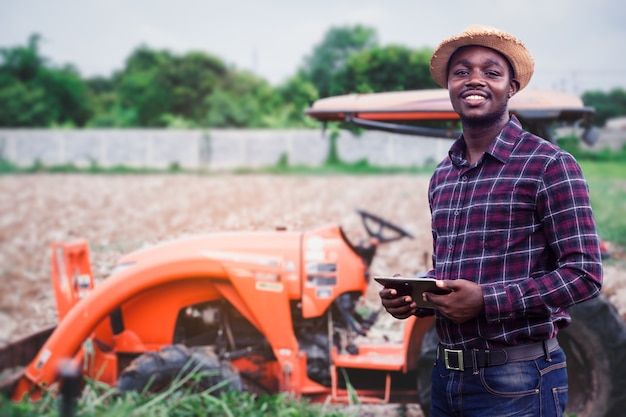When Farming Meets Phones: Africa’s Quiet Tech Revolution

Written By: Olajide Felix
Planting the Seeds of Change
In the quiet corners of rural Africa, a transformation is taking root. The phones that brought in an era of innovation, have now caught up to farming practices — from Weather forecasts, crop advice, and market prices— all of these have become just a few taps away, reshaping how agriculture works.
Across the continent, technology is making its way to fields once left behind. In Kano, a woman farmer dials a code and a tractor arrives the next day—thanks to services like Hello Tractor, known as the 'Uber for tractors'. In Uganda, a young man uses a mobile app to identify crop disease—using AI-driven tools like Agrix Tech, which diagnose crop problems from a single image. In Ghana, farmers coordinate bulk sales through simple SMS alerts.
These aren’t grand tech revolutions. They’re quiet, local, and deeply personal. The tools may be basic — often just USSD codes or offline apps — but the impact is enormous. Farmers are saving time, avoiding waste, and making more informed decisions.
Governments and private firms are beginning to realize the power of these shifts. From Nigeria’s farmer registration platforms to Kenya’s digital soil maps, investment in “agritech” is growing. It’s not just about flashy apps — it’s about making life easier for farmers who have long been under-supported.
Why this is different from past projects is because it's not changing rural life — just complimenting it. Solutions work offline. Interfaces speak local languages. And most importantly, they are designed with farmers, not just for them.
And there’s something that makes this revolution particularly powerful- and that is its quietness. There are no grand speeches or global headlines—just rural farmers sharing voice notes about pests, sending SMS to order seeds, or using solar-powered radios to join training programs. This grassroots energy is what makes the movement sustainable. It belongs to the people using it, not to the companies promoting it.
Growing Smarter, Not Just More
The results are exceptional. With better data, farmers know exactly when to plant and what to expect. They reduce the risks of planting just before a dry spell or using the wrong kind of fertilizer. And that precision leads to more reliable yields.
Tech platforms are also helping reduce losses and waste.Tools like CropIn now offer real-time satellite monitoring and farm intelligence for smallholders. help farmers identify water stress or pests before it’s too late. Some services offer personalized tips based on region, soil type, or crop variety. These insights would have once required expert visits — now they come instantly.
Markets are becoming more transparent too. Farmers no longer have to rely on words-of-mouth to know if prices are fair. Through mobile apps, they can check what onions, tomatoes, or maize are selling for in the nearest city. With this, they can decide whether to sell or wait.
Platforms like Tulaa let farmers save and borrow digitally, enabling them to buy inputs at the right time. When farmers are visible in digital networks, they build transaction histories. That makes them eligible for loans, input financing, or savings accounts. For the first time, a farmer who sells through a traceable system can become “bankable.”
Some platforms now integrate AI to analyze planting conditions and provide region-specific suggestions. These tools can predict disease outbreaks or rainfall shortages using historical and real-time data. For small-scale farmers with little access to expert support, such predictions are lifesaving—allowing them to act early and avoid devastating losses.
These changes ripple out into communities. In places where men once migrated for work, youth now stay to run smart farms. Women, once excluded from market decisions, now lead digital cooperatives. And small villages are evolving into hubs of smart logistics and trade.
Latest Tech News
Decode Africa's Digital Transformation
From Startups to Fintech Hubs - We Cover It All.
Challenges and the Path Forward
Still, the road ahead is far from smooth. Connectivity in many rural areas remains poor. Power supply is inconsistent. And not everyone owns a smartphone — or knows how to use one well. That means some farmers remain cut off from these tools.
Digital literacy is also a barrier. Despite an effort in making most of the apps with farmers, some are still hesitant to trust systems they can’t see or fully understand, so there's not yet full compliance on their parts. Data privacy concerns are real too. Who owns the information farmers input? How is it used, and by whom?
Then there are structural issues. Without good roads, storage facilities, or cold chains, produce still goes bad before reaching the market. Tech can guide a harvest — but it can’t transport it. These infrastructure gaps must as well be addressed alongside the digital ones.
Policy support varies from country to country. Some governments push smart farming aggressively; others are slow to adapt. Without consistent rules on data use, land rights, and financing, digital agriculture risks becoming fragmented. Partnerships between governments, tech firms, and farmers will be key to lasting impact.
Some initiatives are trying to overcome these obstacles with offline-first technology. Tools that don’t require constant internet, like USSD-based advisory systems or downloadable guides, are proving highly effective. But even these depend on literacy levels and access to mobile devices—two hurdles that still block many farmers from joining the digital wave.
But even with the challenges, there’s a growing sense of belief. This is not a passing trend — it’s a quiet restructuring of how African agriculture works. And it’s being driven not by outside experts, but by farmers who are willing to learn, adapt, and lead.
A Future Growing from the Ground Up
This isn’t about robots in rice fields or futuristic machines. It’s about giving farmers the information they need, when they need it. It’s about turning every phone into a tool — not just for communication, but for cultivation.
Digital agriculture won’t solve every issue. But it helps tackle many of the everyday obstacles farmers face. It gives them options. It gives them a voice. And it reduces the randomness that so often defines small-scale farming.
Already, a new generation of rural youth sees agriculture not as a last resort but as an opportunity. With smartphones in hand, they’re creating farm-focused TikTok content, building apps for weather alerts, and running online seed stores. These digital farmers are planting more than crops—they’re planting the future of food and technology on the continent.
Africa doesn’t need to reinvent farming. It just needs to connect it — field to market, farmer to knowledge, crop to value. And with a phone in hand and soil beneath their feet, millions are already doing just that.
Written By: Olajide Felix
You may also like...
When Sacred Calendars Align: What a Rare Religious Overlap Can Teach Us

As Lent, Ramadan, and the Lunar calendar converge in February 2026, this short piece explores religious tolerance, commu...
Arsenal Under Fire: Arteta Defiantly Rejects 'Bottlers' Label Amid Title Race Nerves!

Mikel Arteta vehemently denies accusations of Arsenal being "bottlers" following a stumble against Wolves, which handed ...
Sensational Transfer Buzz: Casemiro Linked with Messi or Ronaldo Reunion Post-Man Utd Exit!

The latest transfer window sees major shifts as Manchester United's Casemiro draws interest from Inter Miami and Al Nass...
WBD Deal Heats Up: Netflix Co-CEO Fights for Takeover Amid DOJ Approval Claims!

Netflix co-CEO Ted Sarandos is vigorously advocating for the company's $83 billion acquisition of Warner Bros. Discovery...
KPop Demon Hunters' Stars and Songwriters Celebrate Lunar New Year Success!

Brooks Brothers and Gold House celebrated Lunar New Year with a celebrity-filled dinner in Beverly Hills, featuring rema...
Life-Saving Breakthrough: New US-Backed HIV Injection to Reach Thousands in Zimbabwe

The United States is backing a new twice-yearly HIV prevention injection, lenacapavir (LEN), for 271,000 people in Zimba...
OpenAI's Moral Crossroads: Nearly Tipped Off Police About School Shooter Threat Months Ago
ChatGPT-maker OpenAI disclosed it had identified Jesse Van Rootselaar's account for violent activities last year, prior ...
MTN Nigeria's Market Soars: Stock Hits Record High Post $6.2B Deal

MTN Nigeria's shares surged to a record high following MTN Group's $6.2 billion acquisition of IHS Towers. This strategi...






